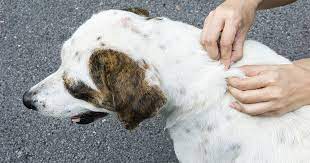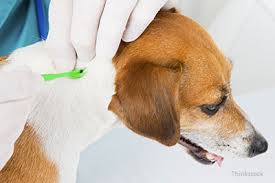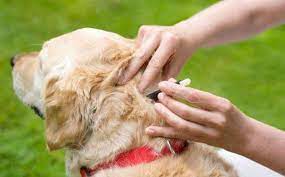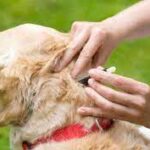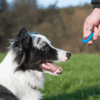How to remove the tick from a dog with alcohol?
Removing ticks from your furry friend is a crucial aspect of pet care, especially after outdoor adventures. Alcohol is not only effective but also a safe method for tick removal, ensuring the process is as stress-free as possible for both you and your pet.
Identifying a Tick on Your Dog
Ticks can be sneaky pests, latching onto your dog unnoticed. Keep an eye out for excessive scratching or biting at a particular spot, which could indicate a tick’s presence. Regularly comb through your dog’s fur with a fine-toothed comb and inspect areas like the ears, neck, and between the toes.
Materials Needed
Before you begin, gather the following:
- Fine-point tweezers
- Rubbing alcohol
- Latex gloves
- A small container for the tick
Benefits of Using Alcohol:
Alcohol is a potent antiseptic that can kill bacteria and viruses on contact. When applied to a tick, it can help to:
- Disinfect the area, reducing the risk of infection.
- Irritate the tick, potentially making it easier to remove.
Precautions When Using Alcohol:
- Use only 70% isopropyl alcohol to avoid skin irritation.
- Avoid contact with the dog’s eyes and mouth.
- Ensure proper ventilation to prevent inhalation of fumes.
Step-by-Step Instructions for Tick Removal:
Preparation:
- Wear gloves to protect yourself from potential pathogens.
- Soak a cotton ball in alcohol and apply it to the tick, ensuring the area is clean.
Removal:
- Using fine-tipped tweezers, grasp the tick as close to the skin’s surface as possible.
- Pull upward with steady, even pressure. Do not twist or jerk the tick.
- After removal, apply alcohol to the area to disinfect it.
Tick Disposal:
- Place the tick in a jar containing alcohol to kill it.
- Do not crush the tick to avoid the spread of pathogens.
Post-Removal Care
After removing the tick, apply a dab of alcohol to the bite site to disinfect it. Keep an eye on the area for a few days for any signs of irritation or infection.
Prevention Tips
Prevent future tick infestations by treating your dog with vet-recommended tick preventatives, checking your dog after walks in wooded areas, and keeping your yard trimmed and tidy.
Regular Vet Visits and Tick-Borne Diseases
Regular veterinary check-ups are essential to ensure your dog is tick-free and to catch any tick-borne diseases early. Diseases like Lyme disease, ehrlichiosis, and anaplasmosis can be serious if not treated promptly.
Understanding Tick Life Cycles
Understanding the life cycle of ticks can help you prevent infestations. Ticks have four life stages: egg, larva, nymph, and adult. Knowing when ticks are most active in your area can help you take proactive measures during peak times.
Natural Remedies and Alternatives
While alcohol is effective, there are also natural remedies that can repel ticks, such as:
- Essential oils (e.g., lavender, peppermint)
- Diatomaceous earth
- Regular baths with tick-repellent shampoos
The Role of Diet in Tick Prevention
A healthy diet can boost your dog’s immune system, making them less attractive to ticks. Foods rich in vitamins and minerals, and supplements like garlic and apple cider vinegar, can be beneficial.
Conclusion
Tick removal doesn’t have to be daunting. With the right knowledge and tools, you can keep your dog safe and comfortable. Remember, prevention is always better than cure, so stay vigilant and keep your pet protected year-round.
This comprehensive guide should equip you with the knowledge to tackle tick issues confidently. Always remember, when in doubt, seek professional veterinary advice to ensure the best care for your beloved pet. 🐶💕
FAQS: Tick Removal from Dogs Using Alcohol
Q: Will rubbing alcohol kill ticks on dogs?
Q: What will draw a tick out of a dog?
Q: Does alcohol make a tick back out?
Q: What kills ticks on dogs instantly?
Q: Is it safe to use alcohol for tick removal on dogs?
Yes, it is safe to use 70% isopropyl alcohol for tick removal. It disinfects the area and can help in making the tick release its grip. However, care should be taken to avoid sensitive areas like the eyes and mouth.
Q: How does alcohol help in tick removal?
Alcohol acts as an antiseptic and irritant to ticks. When applied, it cleans the area and can make the tick loosen its hold, making it easier to remove with tweezers.
Q: What should I do if parts of the tick remain in the dog’s skin after removal?
If parts of the tick’s mouthparts remain, try to remove them with tweezers. If you’re unable to, leave them alone and keep the area clean. The dog’s body will expel them naturally. Consult a vet if you notice any inflammation or infection.
Q: Can I use any type of alcohol for removing ticks?
It’s recommended to use 70% isopropyl alcohol for tick removal. Higher concentrations can be too harsh on the skin, and other types of alcohol may not be as effective.
Q: How should I dispose of the removed tick?
Place the tick in a container with alcohol to kill it. Do not crush the tick, as this can spread infectious agents. Seal the container and dispose of it properly.
Q: What aftercare should I provide my dog following tick removal?
Disinfect the bite area with alcohol, monitor for signs of infection, and consult your vet if you notice any unusual symptoms. Keep the area clean and avoid irritation.
Q: How can I prevent future tick infestations on my dog?
Use vet-recommended tick preventatives, keep your yard trimmed, and check your dog regularly for ticks, especially after spending time outdoors in areas known for ticks.
Q: Should I see a vet after removing a tick from my dog?
If the tick removal went smoothly and your dog shows no signs of distress, a vet visit may not be necessary. However, if you’re concerned about potential diseases or if the tick was attached for a long time, consult your vet.
Related Posts
Natural Dewormers for Dogs: Safe and Effective
March 15, 2024• Dog, Dog Health
How Do I Comfort My Dog After Neutering?
March 6, 2024• Dog, Dog Health
How to Remove Tick from Dog: Step-by-Step Guide
March 2, 2024• Dog, Dog Health
How to Get Rid of Fleas on Dogs Naturally: A Comprehensive Guide
March 2, 2024• Dog, Dog Health
How to remove the tick from a dog with alcohol?
February 28, 2024• Dog, Dog Health

